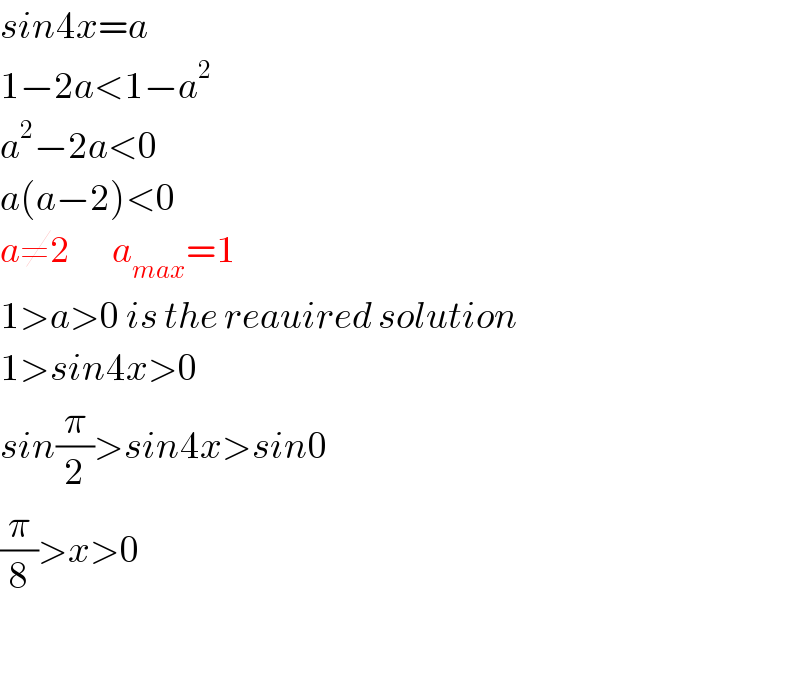Question Number 57357 by ANTARES VY last updated on 03/Apr/19

$$\mathrm{1}−\mathrm{2}\boldsymbol{\mathrm{sin}}\left(\mathrm{4}\boldsymbol{\mathrm{x}}\right)<\boldsymbol{\mathrm{cos}}^{\mathrm{2}} \left(\mathrm{4}\boldsymbol{\mathrm{x}}\right) \\ $$$$\boldsymbol{\mathrm{solve}}. \\ $$
Commented by bshahid010@gmail.com last updated on 03/Apr/19

$$\mathrm{1}−\mathrm{2sin}\left(\mathrm{4x}\right)<\mathrm{cos}^{\mathrm{2}} \left(\mathrm{4x}\right) \\ $$$$\mathrm{1}−\mathrm{2sin}\left(\mathrm{4x}\right)−\mathrm{cos}^{\mathrm{2}} \left(\mathrm{4x}\right)<\mathrm{0} \\ $$$$\mathrm{1}−\mathrm{2sin}\left(\mathrm{4x}\right)−\mathrm{1}+\mathrm{sin}^{\mathrm{2}} \left(\mathrm{4x}\right)<\mathrm{0} \\ $$$$\mathrm{sin}^{\mathrm{2}} \mathrm{4x}−\mathrm{2sin4x}<\mathrm{0} \\ $$$$\mathrm{sin4x}\left(\mathrm{sin4x}−\mathrm{2}\right)<\mathrm{0} \\ $$$$\mathrm{sin4x}\in\left(\mathrm{0},\mathrm{2}\right)\:\mathrm{so}\:\mathrm{sin4x}\in\left(\mathrm{0},\mathrm{1}\right) \\ $$$$\mathrm{x}\in\left(\mathrm{0},\mathrm{sin1}\right) \\ $$$$ \\ $$
Commented by tanmay.chaudhury50@gmail.com last updated on 03/Apr/19

$${max}\:{value}\:{of}\:{sin}\theta=\mathrm{1}\: \\ $$$${so}\:{i}\:{think}\:\:\:\:{sin}\mathrm{4}{x}\in\left(\mathrm{0},\mathrm{1}\right)\:{but}\: \\ $$$${sin}\mathrm{4}{x}\notin\left(\mathrm{0},\mathrm{2}\right)\: \\ $$$${let}\:{other}\:{comment}… \\ $$
Answered by tanmay.chaudhury50@gmail.com last updated on 03/Apr/19

$${sin}\mathrm{4}{x}={a} \\ $$$$\mathrm{1}−\mathrm{2}{a}<\mathrm{1}−{a}^{\mathrm{2}} \\ $$$${a}^{\mathrm{2}} −\mathrm{2}{a}<\mathrm{0} \\ $$$${a}\left({a}−\mathrm{2}\right)<\mathrm{0} \\ $$$${a}\neq\mathrm{2}\:\:\:\:\:\:\:{a}_{{max}} =\mathrm{1} \\ $$$$\mathrm{1}>{a}>\mathrm{0}\:{is}\:{the}\:{reauired}\:{solution}\: \\ $$$$\mathrm{1}>{sin}\mathrm{4}{x}>\mathrm{0} \\ $$$${sin}\frac{\pi}{\mathrm{2}}>{sin}\mathrm{4}{x}>{sin}\mathrm{0} \\ $$$$\frac{\pi}{\mathrm{8}}>{x}>\mathrm{0} \\ $$$$ \\ $$
Commented by ANTARES VY last updated on 03/Apr/19

$$??? \\ $$
Answered by einsteindrmaths@hotmail.fr last updated on 03/Apr/19
/(2 ));(((2k+1)π)/4)[](https://www.tinkutara.com/question/Q57367.png)
$${c}\mathrm{os}\:^{\mathrm{2}} \left(\mathrm{4}{x}\right)=\mathrm{1}−{sin}^{\mathrm{2}} \left(\mathrm{4}{x}\right)====>\mathrm{1}−\mathrm{sin}\left(\mathrm{4}{x}\right)<\mathrm{1}−{sin}^{\mathrm{2}} \left(\mathrm{4}{x}\right) \\ $$$$==>{sin}^{\mathrm{2}} \left(\mathrm{4}{x}\right)−{sin}\left(\mathrm{4}{x}\right)<\mathrm{0}==>{sin}\left(\mathrm{4}{x}\right)\left(\mathrm{1}−{sin}\left(\mathrm{4}{x}\right)\right)<\mathrm{0}==> \\ $$$$\left.{sin}\left(\mathrm{4}{x}\right)>\mathrm{0\&1}−{sin}\left(\mathrm{4}{x}\right)\neq\mathrm{0}===>{x}\neq\left\{\frac{\pi}{\mathrm{8}}+\frac{{k}\pi}{\mathrm{2}}/{k}\in{IZ}\right\}\cup\right]\frac{{k}\pi}{\mathrm{2}\:};\frac{\left(\mathrm{2}{k}+\mathrm{1}\right)\pi}{\mathrm{4}}\left[\right. \\ $$
Answered by mr W last updated on 03/Apr/19

$$\mathrm{1}−\mathrm{2}\:\mathrm{sin}\:\left(\mathrm{4}{x}\right)<\mathrm{1}−\mathrm{sin}^{\mathrm{2}} \:\left(\mathrm{4}{x}\right) \\ $$$$\mathrm{sin}\:\left(\mathrm{4}{x}\right)\left\{\mathrm{sin}\:\left(\mathrm{4}{x}\right)−\mathrm{2}\right\}<\mathrm{0} \\ $$$${since}\:\mathrm{sin}\:\left(\mathrm{4}{x}\right)−\mathrm{2}<\mathrm{0} \\ $$$$\Rightarrow\mathrm{sin}\:\left(\mathrm{4}{x}\right)>\mathrm{0} \\ $$$${or} \\ $$$$\Rightarrow\mathrm{0}<\mathrm{sin}\:\left(\mathrm{4}{x}\right)\leqslant\mathrm{1} \\ $$$$\Rightarrow\mathrm{4}{x}\in\left(\mathrm{2}{n}\pi,\mathrm{2}{n}\pi+\pi\right) \\ $$$$\Rightarrow{x}\in\left(\frac{{n}\pi}{\mathrm{2}},\frac{{n}\pi}{\mathrm{2}}+\frac{\pi}{\mathrm{4}}\right)\:{with}\:{n}\in\mathbb{W} \\ $$
